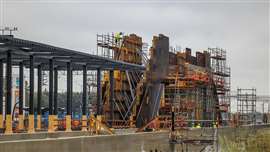Read this article in Français Deutsch Italiano Português Español
Vinci consortium awarded €1.77 billion Rail Baltica contract
22 September 2025
COBELEC Rail Baltica, a consortium comprising of VINCI subsidiary Cobra IS and Elecnor Servicios y Proyectos S.A.U, has been appointed to Rail Baltica’s electrification €1.77 billion ($2 billion) project.
 Photo: Rail Baltic Estonia
Photo: Rail Baltic Estonia
The consortium will carry out the design and construction of the electrification subsystem across 870 km and over 2,400 km of tracks in Estonia, Lithuania and Latvia.
The works will be implemented in two phases, Rail Baltica said. Phase one, worth €944 million ($1.1 billion), is expected to be completed in 2030.
The project will use the large-scale use of Static Frequency Converter (SFC) technology combined with 2x25 kV in a 50 Hz system, powered by ten substations.
The consortium said: “This contract marks a major milestone in Rail Baltica’s development, and we are proud to lead Europe’s largest railway electrification project. Cobra and Elecnor have a proven track record of delivering customised, high-quality solutions.
“Drawing on our combined expertise, we have a solid history of executing complex projects to the highest standards. We are committed to supporting Rail Baltica’s strategic role in strengthening regional connectivity and EU integration.”
Marko Kivila, CEO and Chairman of the Board, RB Rail AS, added: “Electrification is not only about powering trains – it is about enabling sustainable mobility, ensuring interoperability with the European network, and securing long-term energy efficiency for the entire region.
“At the same time, this is a highly complex agreement. To ensure that every necessary step is taken and the timeline remains aligned with the overall Rail Baltica development, the electrification works will be implemented in parallel with the wider project.”
The Rail Baltica railway project is said to be the largest rail electrification project currently under way in Europe.
To date, over 100 km of railway substructure is underway in Estonia, while in March Rail Baltica Estonia signed two major construction contracts totalling up to €932 million (US$1.06 billion).
The contracts cover the full passenger mainline route through the country and formally initiating the project’s development phase.
In Latvia, large-scale construction works are underway near Iecava, while progress is being made on the 230 km framework agreement and major developments at the Riga Central Hub and Airport terminals.
Construction on the Kaunas–Panevėžys section in Lithuania is also underway, with 77 km of embankments and engineering structures ongoing.
Rail Baltica expects 43% of the mainline to be construction-ready by the end of 2025.
STAY CONNECTED


Receive the information you need when you need it through our world-leading magazines, newsletters and daily briefings.
CONNECT WITH THE TEAM











